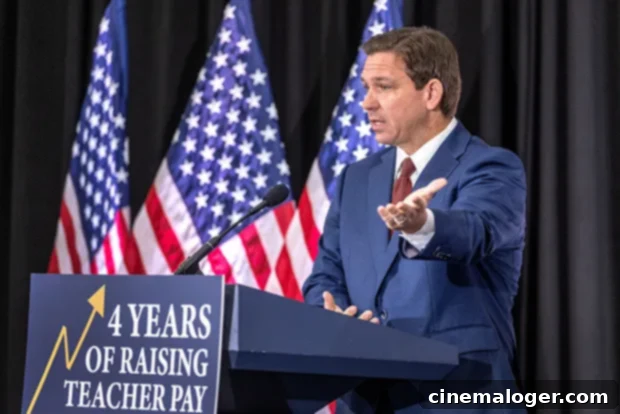Ron DeSantis 2024: A Deep Dive into the Florida Governor’s Policies and Presidential Campaign
Florida Governor Ron DeSantis officially declared his candidacy for the 2024 Republican presidential nomination on Wednesday, May 24, marking his formal entry into a potentially crowded and contentious primary field. DeSantis, a prominent figure in conservative politics, has served as Florida’s governor since 2019 and previously represented the state’s 6th district in the U.S. House of Representatives from 2013 to 2018. His political career has been characterized by a series of high-profile, often controversial, policy decisions that have solidified his reputation among conservatives while drawing sharp criticism from opponents.
DeSantis’s campaign launch began with an eagerly anticipated announcement via a video release on Twitter, followed by a conversation with Twitter CEO Elon Musk on the platform’s Spaces feature. Despite technical glitches that initially marred the Spaces event, DeSantis articulated his vision for an “American comeback,” touching upon key issues such as education and his ongoing public dispute with Disney. Following the digital launch, he transitioned to a traditional television interview on Fox News, where he reiterated his campaign themes and addressed the prior technical difficulties with humor, stating, “Fox News will not crash during this interview.”
- Ron DeSantis, a former U.S. Congressman, has served as Governor of Florida since January 2019.
- His policies on issues like LGBTQ+ rights, education, and Diversity, Equity, and Inclusion (DEI) programs have generated significant national debate.
- DeSantis formally filed paperwork to run for president on May 24, 2023, setting the stage for a competitive Republican primary.
As DeSantis formally steps onto the national political stage, he is poised to challenge other Republican hopefuls, most notably former President Donald Trump. His tenure as Florida’s governor has seen the implementation of policies that resonate strongly with a conservative base, often positioning him at the forefront of the nation’s “culture wars.” This article will explore some of his most significant and widely discussed policy stances that are expected to be central to his presidential campaign.

DeSantis’s Stance on Abortion: Implementing a Six-Week Ban
One of Governor DeSantis’s most impactful and contentious actions during his governorship has been his firm stance on abortion rights. On April 13, 2023, he signed into law Florida’s “Heartbeat Protection Act,” which effectively prohibits abortions once a fetal heartbeat can be detected, typically around six weeks of pregnancy. This legislation was a significant escalation from a prior 15-week ban he signed almost exactly one year earlier, known as the “Reducing Fetal and Infant Mortality Act.”
In a statement accompanying the signing of the six-week ban, DeSantis expressed his strong support, declaring, “I applaud the Legislature for passing the Heartbeat Protection Act that expands pro-life protections and provides additional resources for young mothers and families.” The bill does include exceptions for cases where the mother’s life is at risk, and, up to 15 weeks, for instances of rape and incest, provided proper documentation is presented. These new restrictions have ignited intense debate, particularly in the wake of the Supreme Court’s decision in June 2022 to overturn Roe v. Wade, which eliminated the federal constitutional right to abortion and returned regulatory authority to individual states.
Examining the Implications of Florida’s Six-Week Abortion Ban
With the implementation of the Heartbeat Protection Act, Florida has joined a group of 13 states that have enacted a six-week abortion ban, including Georgia, Texas, Idaho, Iowa, Kentucky, Louisiana, Mississippi, North Dakota, Ohio, Oklahoma, South Carolina, and Tennessee. Beyond making abortions illegal after six weeks, Florida’s new bill carries severe penalties, categorizing the performance of abortions by doctors after this period as a second-degree felony. Furthermore, the legislation restricts state funds from being allocated to businesses or educational institutions that support employees or students traveling out of state to obtain abortion services, a measure highlighted by Planned Parenthood Action.
The wave of six-week abortion bans across the country, spurred by the overturning of Roe v. Wade, has drawn widespread condemnation from medical professionals, women’s rights advocates, and reproductive health organizations. A primary point of criticism centers on the fact that at six weeks of pregnancy, many individuals are not yet aware they are pregnant. This early cutoff often leaves little to no time for individuals to discover their pregnancy, consider their options, and access necessary healthcare services within Florida. Consequently, these laws compel many pregnant individuals to undertake costly and often difficult journeys to other states where abortion remains legal, disrupting their lives and delaying access to care, as noted by Planned Parenthood.
DeSantis and Education: Controversial Book Bans and the “Don’t Say Gay” Law
Education has been a central battleground in Governor DeSantis’s policy agenda, particularly concerning curriculum content and library materials. Under his leadership, Florida’s Republican-majority legislature has passed laws designed to restrict the use of books in classrooms and school libraries that discuss topics such as race, gender, and sexual orientation. This has led to the removal or restriction of numerous titles, including acclaimed works like Toni Morrison’s Beloved and Margaret Atwood’s The Handmaid’s Tale, as reported by The New York Times. DeSantis has also been a vocal opponent of “critical race theory” being taught in schools, claiming it promotes divisive ideologies.

Responding to claims that his administration is enacting widespread book bans, DeSantis has publicly dismissed these accusations as a “hoax.” In a press release, he stated, “Exposing the ‘book ban’ hoax is important because it reveals that some are attempting to use our schools for indoctrination. In Florida, pornographic and inappropriate materials that have been snuck into our classrooms and libraries to sexualize our students violate our state education standards. Florida is the education state and that means providing students with a quality education free from sexualization and harmful materials that are not age appropriate.” This argument frames the removals not as censorship but as an effort to protect children from age-inappropriate or “pornographic” content.
Beyond book challenges, DeSantis also championed the Florida Parental Rights in Education Act, widely known as the “Don’t Say Gay” bill. Initially enacted to prohibit classroom instruction on sexual orientation or gender identity for children from kindergarten through third grade, the law was controversially expanded in March 2023 to apply to all grades, as reported by The Associated Press. This expansion intensified concerns among LGBTQ+ advocates and educators nationwide.
Following the bill’s expansion, GLAAD, a prominent LGBTQ+ advocacy group, issued a strong rebuke. Sarah Kate Ellis, GLAAD President and CEO, stated in a press release, “This move unfortunately further cements Florida’s growing reputation as a state led by extremists obsessed with censorship, book bans and other targeting of LGBTQ people. ‘Don’t Say LGBTQ’ has already had a disastrous chilling effect on Florida classrooms, now Florida wants to expand and encourage that silencing and harassment to all grades.” Critics argue that the law creates a hostile environment for LGBTQ+ students and teachers, effectively silencing discussions vital for inclusion and understanding.
Understanding the Florida Parental Rights in Education Act and Its Reach
The Parental Rights in Education Act extends beyond classroom content, mandating that schools notify parents about any significant changes in a child’s mental, emotional, or physical health or well-being, as detailed in a press release from the Governor’s office. This provision has raised concerns among LGBTQ+ organizations, who, alongside other advocacy groups, have filed lawsuits challenging the law. They argue that it serves as a mechanism to censor LGBTQ+ individuals and discussions related to their community, potentially endangering students who might rely on school support systems for their mental health. Additionally, Florida has passed laws prohibiting educators from inquiring about students’ preferred pronouns, further limiting the expression of gender identity in schools, according to NPR.
Transgender Rights Under DeSantis: A Scrutiny of New Policies
Florida, under Governor DeSantis, has been at the forefront of states enacting legislation targeting the rights of transgender individuals, particularly youth. On May 17, 2023, DeSantis signed four bills into law that directly impact the LGBTQ+ community. Among these, SB254 stands out, banning gender-affirming care for transgender minors, including puberty blockers, hormone replacement therapy, and surgeries. Another significant bill mandates that transgender individuals use public restrooms corresponding to the sex they were assigned at birth, a policy that has sparked considerable outrage and legal challenges, as reported by the BBC.
Impact on Transgender Youth: Affirming Care and Identity Issues
These legislative measures have prompted widespread condemnation from major medical organizations across the United States. The American Medical Association (AMA) has issued a powerful statement urging legislators to cease interfering in the patient-physician relationship. The AMA emphasized, “Decisions about medical care belong within the sanctity of the patient-physician relationship. We believe it is inappropriate and harmful for any state to legislatively dictate that certain transition-related services are never appropriate and limit the range of options physicians and families may consider when making decisions for pediatric patients.” This stance underscores a broad medical consensus that gender-affirming care, when clinically appropriate, is essential for the health and well-being of transgender youth.
While many medical professionals support access to affirming care, current guidelines typically recommend that transgender teens do not undergo gender-affirming genital surgery until they reach 18 years of age, as noted by The Washington Post. However, other forms of care, such as puberty blockers and hormone therapy, are often seen as critical interventions during adolescence to alleviate gender dysphoria and allow for a smoother transition later in life. Banning such care for minors can have severe psychological impacts, leading to increased rates of depression, anxiety, and suicidal ideation among transgender youth.
In response to the proliferation of anti-LGBTQ+ bills passed by the Florida legislature and signed by DeSantis, several prominent advocacy groups, including the Human Rights Campaign (HRC) and Equality Florida, have issued travel advisories for the state. Kelley Robinson, HRC President, released a statement warning members of the LGBTQ+ community about DeSantis’s policies, asserting, “Because of Ron DeSantis and his frenzied appeal to extremists, LGBTQ+ people in Florida are finding themselves in a state of emergency every single day. Since the day he took office, Governor DeSantis has weaponized his position to weave bigotry, hate, and discrimination into public law for his own political gain.” Robinson urged visitors and residents to actively oppose these policies, highlighting the growing perception of Florida as an unwelcoming state for LGBTQ+ individuals.
This HRC advisory came on the heels of a similar travel warning issued by the NAACP, which also cautioned African Americans, people of color, and LGBTQ+ individuals about visiting Florida. The NAACP’s statement declared, “Florida is openly hostile toward African Americans, people of color and LGBTQ+ individuals. Before traveling to Florida, please understand that the state of Florida devalues and marginalizes the contributions of, and the challenges faced by African Americans and other communities of color.” These advisories reflect a deep concern among civil rights organizations that Florida’s legislative actions are creating a discriminatory and potentially unsafe environment for marginalized communities.

DeSantis’s Position on Diversity, Equity, and Inclusion (DEI) Programs
Further solidifying his stance against what he terms “woke ideology,” Florida Governor Ron DeSantis signed a bill on May 15, 2023, prohibiting public colleges and universities from using state and federal funds for diversity, equity, and inclusion (DEI) programs. According to The Associated Press, the legislation aims to redirect resources away from what DeSantis views as discriminatory initiatives towards fostering “diversity of thought, civil discourse, and the pursuit of truth.”
In a press release announcing the bill’s signing, the governor’s office asserted that such programs are inherently “discriminatory” and that their removal would empower educational institutions. DeSantis stated, “By signing this legislation we are ensuring that Florida’s institutions encourage diversity of thought, civil discourse, and the pursuit of truth for generations to come.” He has consistently argued that DEI programs are attempts to “indoctrinate” students with ideologies contrary to traditional American values, framing his actions as a defense against what he perceives as radical left-wing influence in education.
Implications for Public Schools and Colleges
The ban on DEI funding at public universities has drawn considerable criticism, with many academics and administrators calling it a politically motivated move that undermines the core mission of higher education. Pardis Mahdavi, Provost and Executive Vice President of the University of Montana, articulated the potential losses for schools in an op-ed for The Los Angeles Times. Mahdavi explained that DEI funding is often crucial for coordinating important cultural events, guest speakers, and initiatives that celebrate various cultures and identities within the student body.
Mahdavi highlighted the ambiguity introduced by the new law, noting, “Administrators will now question whether they can continue to financially support events of this type because it is unclear if they might fall under prohibited diversity initiatives.” She further argued for the intrinsic value of DEI, stating, “Schools without diversity programs put students at a disadvantage. If one of the goals of higher education is to prepare students to enter and develop the workforce — a goal lauded by politicians on both sides of the aisle — colleges must teach them the skills to engage with diversity work.” Critics contend that dismantling DEI programs could lead to less inclusive campus environments, hinder the academic success of minority students, and ultimately reduce the preparedness of graduates for a diverse global workforce.
Gun Control in DeSantis’s Florida: A Move Toward Looser Laws
In stark contrast to a national push for stricter gun safety measures, Governor DeSantis has moved Florida toward more permissive gun laws. In April, he signed HB 543, a bill allowing Floridians to carry concealed firearms without a government-issued permit, a policy often referred to as “constitutional carry.” This decision aligns Florida with a growing number of states that have adopted similar permitless carry laws, despite widespread calls for enhanced gun control following numerous mass shootings across the United States. While some gun rights activists continue to advocate for even looser regulations, such as open carry, DeSantis’s move represents a significant shift in Florida’s approach to firearm ownership, as reported by Politico.
Specifics of DeSantis’s Gun Laws and Their Impact
House Bill 543 eliminates the state’s prior requirement for gun owners to obtain a permit for concealed carry, effectively allowing eligible individuals to carry firearms hidden from public view without undergoing the previously mandated licensing process. While the Florida Department of Agriculture and Consumer Services will continue to issue concealed carry licenses for those who wish to obtain them (perhaps for reciprocity in other states), the permit is no longer necessary for concealed carry within Florida. This legislative change comes at a time when America continues to grapple with an epidemic of gun violence. As of early May 2023, the United States had already experienced over 200 mass shootings, according to ABC News.
Research from organizations like the Center for American Progress suggests a concerning link between lax concealed carry laws and increased violent crime. Their findings indicate that states with less stringent requirements for concealed carry permits often report higher rates of mass shootings, overall violent crime, and firearm robberies. Proponents of permitless carry argue that it enhances self-defense capabilities for law-abiding citizens, aligning with Second Amendment rights. However, opponents express fears that removing the permit requirement, which often includes some level of training or background checks, could lead to more accidental shootings, increased gun violence, and make it harder for law enforcement to distinguish between responsible gun owners and those with ill intent.
DeSantis and Entertainment: The Ban on Drag Shows
Another piece of legislation championed by Governor DeSantis and widely criticized as anti-LGBTQ+ is SB1438, signed into law on May 17, 2023. This bill significantly restricts children from attending drag shows and similar “adult performances.” The law prohibits adults from bringing minors to such performances and grants the state the power to revoke food or liquor licenses from venues that permit children to attend drag performances. In a statement defending the bill, Governor DeSantis declared that Florida was “standing up for our children,” framing the legislation as a measure to protect minors from sexually explicit content.
The American Civil Liberties Union (ACLU) of Florida quickly dubbed the legislation the “Anti-Drag Show” bill, pointing out that its language is vaguely worded. The ACLU argued that the law contains “vague language that can be used to attack drag shows and performances even though Florida law already prohibits exposing minors to shows considered sexually explicit or harmful.” Critics fear that the broad definitions within the bill could be weaponized to target any performance that features gender non-conformity, stifling artistic expression and cultural events important to the LGBTQ+ community, well beyond what might be considered genuinely “harmful” to children. The law’s enforcement could disproportionately affect small businesses and cultural institutions that host drag performances, often a source of income and community gathering for LGBTQ+ individuals and their allies.
Voting in DeSantis’s Florida: Tougher Laws for Registration and Voting
Following the 2020 presidential election and former President Trump’s unsubstantiated claims of widespread voter fraud, Governor DeSantis and the Florida legislature have enacted several stringent laws concerning voter registration and election administration. In 2021, DeSantis signed SB90, a bill he stated was designed to “safeguard the sanctity of Florida Elections.” Key provisions of this bill included strengthening voter identification requirements, prohibiting the mass mailing of ballots (a practice expanded during the COVID-19 pandemic), banning “ballot harvesting” (the collection and submission of ballots by third parties), and prohibiting private money from influencing election administration, as outlined in a gubernatorial press release.
Further solidifying these efforts, in April 2022, DeSantis signed another election-related bill. This legislation mandated annual updates to voter rolls, significantly increased penalties for voting fraud offenses, and established the “Office of Election Crimes and Security” specifically tasked with investigating election law violations. Crucially, some of these laws also allowed for citizens who were previously disenfranchised due to past felony convictions, but who had since had their voting rights restored, to be charged with voter fraud if they mistakenly registered or cast a ballot.
The Potential Impact on Voter Turnout in Florida
Many of DeSantis’s voting laws have been met with intense criticism, with opponents arguing that they are confusing, overly restrictive, and unfairly target minority voters and those with past convictions. A significant controversy arose after the 2020 election when 20 voters, many of whom were Black and had previous felony convictions, were arrested on voter fraud charges. These individuals had reportedly been incorrectly informed by election officials that they were eligible to vote, leading to arrests that civil rights groups condemned as unjust and punitive, as reported by the Tallahassee Democrat.
In response to these arrests and the broader legislative changes, a coalition of Florida organizations, including the NAACP, ACLU, and Brennan Center, issued a joint statement. They criticized the lack of clarity in the state’s election laws, stating, “The DeSantis Administration and the state legislature made it nearly impossible for people with past convictions to determine their eligibility to vote and the state continues to refuse to provide any meaningful guidance to ensure that these Floridians can find out whether they’re eligible to vote.” This lack of clear guidance, critics argue, creates a chilling effect, deterring eligible voters with past convictions from participating in elections out of fear of legal repercussions.
Indeed, Florida experienced a notable decrease in voter turnout for the 2022 midterm elections compared to the 2018 midterms, according to the Palm Beach Daily News. This decline is attributed by many to the new, stricter voting laws and the fear generated by voter arrests. A significant number of voters with past convictions, despite being potentially eligible, chose not to cast ballots in the most recent midterms, fearing being charged with fraud. Critics argue that these laws, while ostensibly aimed at preventing fraud, ultimately serve to suppress voter turnout, particularly among demographics that have historically faced barriers to exercising their right to vote.
